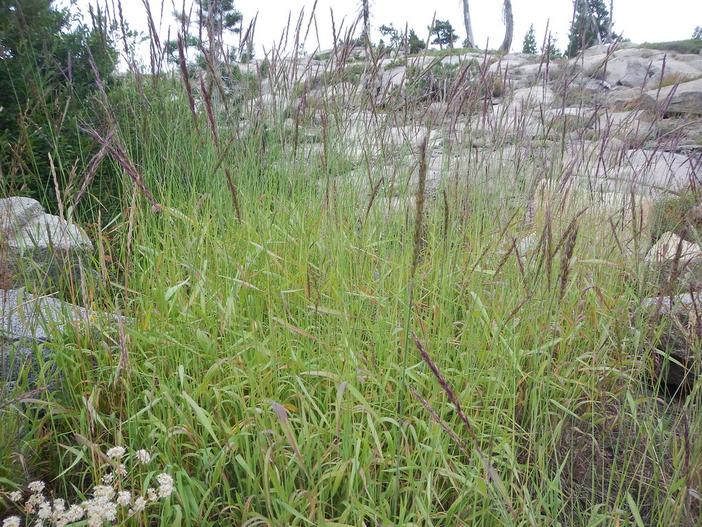Blue Wild Rye
(Elymus glaucus)
Blue Wild Rye (Elymus glaucus)
/
/

Matt Lavin
CC BY-SA 2.0
Image By:
Matt Lavin
Recorded By:
Copyright:
CC BY-SA 2.0
Copyright Notice:
Photo by: Matt Lavin | License Type: CC BY-SA 2.0 | License URL: https://creativecommons.org/licenses/by-sa/2.0/ | Uploader: Matt Lavin | Publisher: Flickr























Estimated Native Range
Summary
Elymus glaucus, commonly known as Blue Wild Rye, is a perennial bunch grass native to a variety of habitats including open woodlands, grasslands, and chaparral regions in the western and intermountain regions of North America, as well as Northern Mexico. It typically forms small, narrow tufts with several erect stems, reaching heights of 0.5–1.5 m (1 ft 8 in – 4 ft 11 in). Blue Wild Rye is often found in association with other native grasses such as Danthonia californica, Deschampsia caespitosa, Festuca idahoensis, and Nassella pulchra in coastal prairies of the far west.
Blue Wild Rye is valued for its adaptability to various soil types and its ability to thrive with minimal water, making it suitable for xeriscaping and restoration projects. It is often used for erosion control, habitat restoration, and as an ornamental grass in naturalistic landscaping. The grass prefers full sun to part shade and medium-drained soils. While it is generally low-maintenance, it can be susceptible to rust diseases under certain conditions. Blue Wild Rye does not have aggressive roots, making it a good choice for garden plantings where root competition is a concern.CC BY-SA 4.0
Blue Wild Rye is valued for its adaptability to various soil types and its ability to thrive with minimal water, making it suitable for xeriscaping and restoration projects. It is often used for erosion control, habitat restoration, and as an ornamental grass in naturalistic landscaping. The grass prefers full sun to part shade and medium-drained soils. While it is generally low-maintenance, it can be susceptible to rust diseases under certain conditions. Blue Wild Rye does not have aggressive roots, making it a good choice for garden plantings where root competition is a concern.CC BY-SA 4.0
Plant Description
- Plant Type: Grass
- Height: 2-5 feet
- Width: 1-3 feet
- Growth Rate: Moderate
- Flower Color: N/A
- Flowering Season: Spring, Summer
- Leaf Retention: Deciduous
Growth Requirements
- Sun: Full Sun, Part Shade
- Water: Low
- Drainage: Medium
Common Uses
Bee Garden, Bird Garden, Butterfly Garden, Deer Resistant, Drought Tolerant, Erosion Control, Fire Resistant, Groundcover, Low Maintenance, Street Planting
Natural Habitat
Native to open woodlands, grasslands, and chaparral regions
Other Names
Common Names: blue wildrye
Scientific Names: Elymus glaucus , Elymus glaucus var. glaucus , Clinelymus glaucus , Elymus americanus , Elymus sibiricus var. glaucus , Terrellia glauca
GBIF Accepted Name: Elymus glaucus Buckley